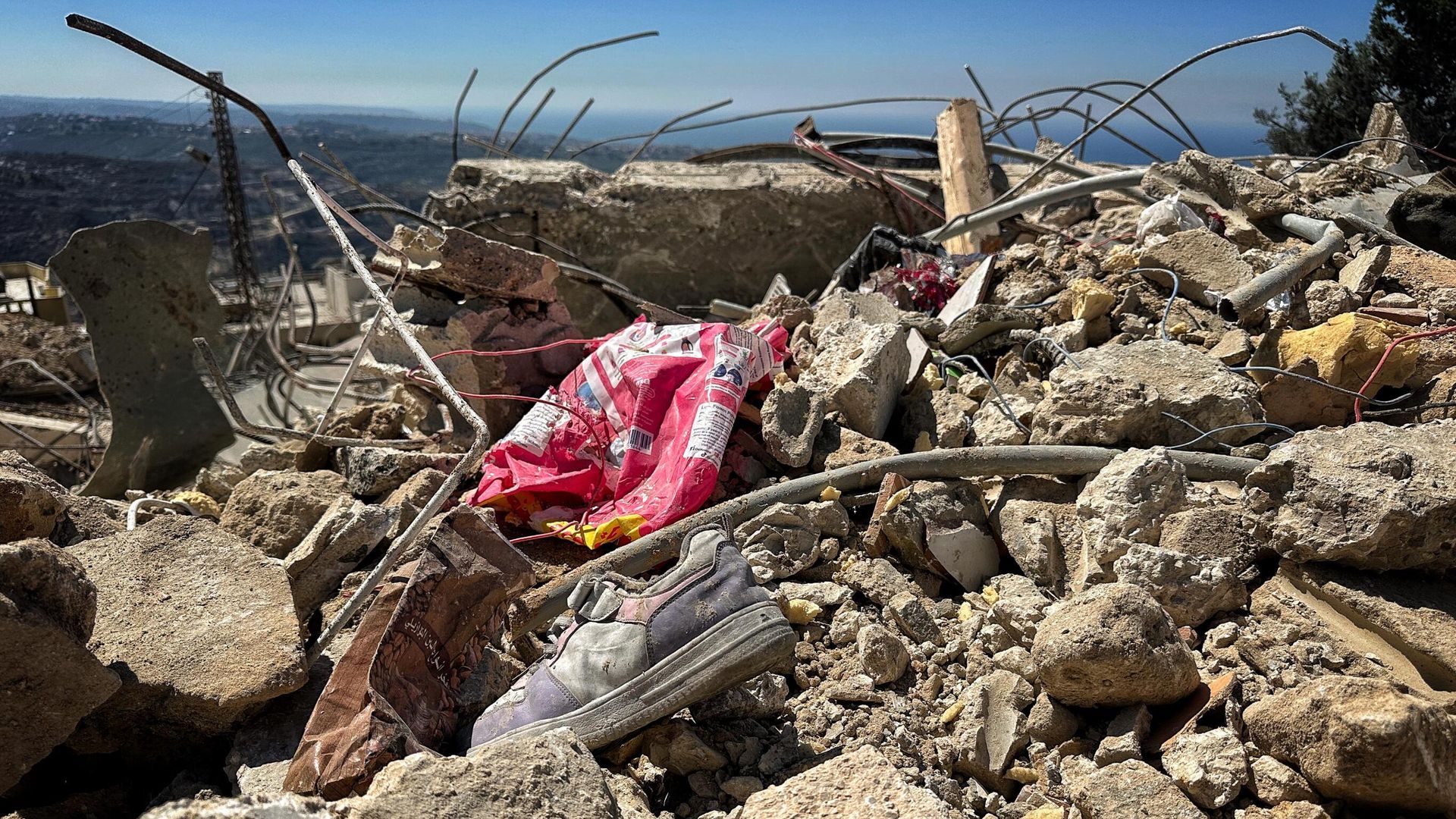There seemed little sign of any let-up in the Israeli bombardment of Lebanon with a spray of early morning strikes in the south. There were others in the eastern Bekaa Valley and northeast of the capital, Beirut.
While we were in the hills of Mount Lebanon region in the southwest of the country, there were regular airstrikes landing south of us. Israeli drones circled above and we heard sonic booms as Israeli jets broke the sound barrier.
“These are tactics to terrorise us,” one resident in the village of Joun told us.
Weeping women and Al Risala scouts gathered with crowds of other Joun villagers for the funeral of a six-year-old boy, his mother and his father.
The family was one of three inside a home high above the village when the Israeli bomb hit.
There’s nothing left of the home now.
Follow latest:
Netanyahu says military will keep fighting with ‘full force’
The father, Khodor Raad, is well-known locally. He ran a taxi service and worked as a welder but was also involved in Hezbollah’s social welfare programmes, according to the village’s residents.
“He was not a fighter,” one Hezbollah representative told us. “The area where he lived would not allow weapons there, for sure.”
The villagers we spoke to told us Khodor’s family had taken in two other families who had been displaced by the recent Israeli bombardment.
One family of three children and their mother was from Syria while the second family, a mother and her two children, had fled the onslaught in the south just a day earlier.
Khodor was the senior adult male in the house. The other males were his young son, Hassan, and two elder brothers, one a teenager.
The airstrike just after 10.30am on Wednesday wiped out the bulk of three families, killing six children, three mothers and the patriarch Khodor.
Hassan’s brothers somehow escaped. The elder of the two, 21-year-old Ahmad, had to be pulled out of the rubble with head wounds and a lacerated hand. Yousuf, 15, seems to have escaped unscathed.
This is the first time Mount Lebanon Governorate has been hit in nearly a year of increasingly deadly exchanges between Israel and Lebanon. During this time (according to the non-profit organisation ACLED) Israel has fired nearly five times as many missiles into Lebanon as Hezbollah has launched into Israel.
But the exchanges until a week ago were mainly confined to the border region, although they’d caused a serious amount of displacement in both Israel and Lebanon. About 60,000 Israelis have fled their homes and 120,000 families have had to abandon their houses on the Lebanese side.
This week though, the massive spike in Israeli airstrikes – more than a thousand in a single day on Monday – plus the Israeli authorities’ warnings to evacuate – prompted another huge wave of people to up and move to try to escape the bombings.
The Lebanese government has estimated the displacement is likely to reach half a million with a rapidly growing humanitarian crisis.
The funerals in Joun have stunned the small community who have opened their homes to thousands of displaced people.
“Please treat our displaced brothers and sisters with courtesy and kindness,” the village representative told the funeral crowds.
Read more:
Washington says a Lebanon ceasefire is ‘close’
British mum trying to flee Lebanon with her children
Be the first to get Breaking News
Install the Sky News app for free
Six-year-old Hassan’s school friends and fellow scouts were among the funeral mourners and his scout leader, who was one of the pallbearers, openly sobbed.
“We are civilians,” said a family relative called Mostafa Issa – despite the presence of young soldiers clad in military-style camouflage outfits.
At the head of the pallbearers was Hassan’s elder brother, Ahmad, also in uniform – a fact which officials attempted to explain away by saying “he’d just put on the uniform for the funeral”.
“The Israelis are claiming they are targeting Hezbollah weapons,” Mostafa Issa told us. “But this family took in two other displaced families! Why would they have weapons? They are civilians and the Israelis are hitting civilians.”
He went on: “These crimes should stop wherever they are being carried out – in Lebanon, Gaza and Syria.”
The crushed family home is a pile of rubble now. Vehicles parked around it, including their neighbours’, are mangled.
School books can be seen half buried in the broken stones, as well as a child’s pair of trousers.
“We are prepared to die,” said one young man called Hussein. “We are not the terrorists! It is the one who is bombing us and our homes who is the terrorist. We are all prepared to die for humanity.”
He went on, his face quivering with emotion: “40,000 people have been killed in Gaza. Most of them are women and children. And yet it is us who are called the terrorists.”
Keep up with all the latest news from the UK and around the world by following Sky News
Hezbollah is a proscribed terror outfit in Israel, the USA and the UK, among other nations. And it has a fierce control over parts of the country, particularly the south.
It has a powerful weapons cache, including long-range missiles, has tens of thousands of fighters and enjoys financial and intelligence support from Iran.
But the militant group also has a political wing with MPs in parliament and an active social welfare programme running schools, hospitals and aid groups which further cements its grip on parts of the population.
Additional reporting by: camera Jake Britton, specialist producer Chris Cunningham, and Lebanon producers Jihad Jineid, Sami Zein and Hwaida Saad




